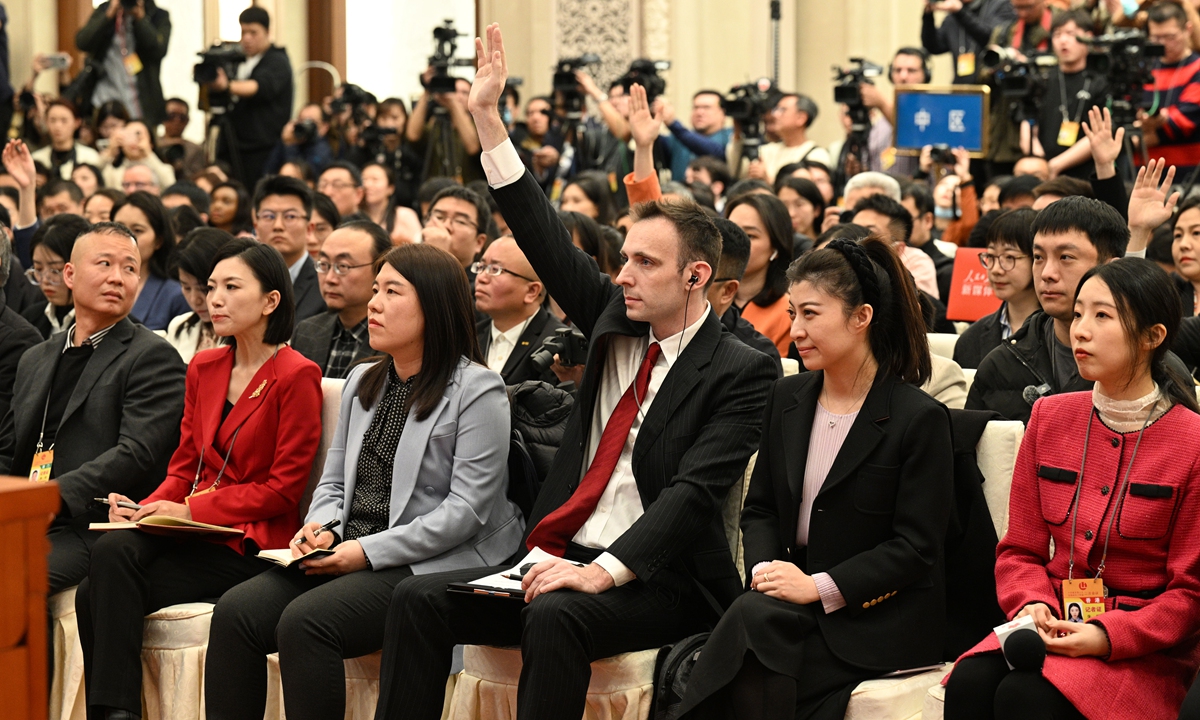
A foreign journalist raises his hand to ask a question at the news conference for the second session of the 14th CPPCC National Committee at the Great Hall of the People in Beijing on March 3, 2024. More than 3,000 reporters from home and abroad have registered to report on this year's two sessions, a significant increase compared to previous years. Photo: VCG
The National Committee of the Chinese People's Political Consultative Conference (CPPCC), the country's top political advisory body, will hold its annual session from Monday to March 10, which will continue to focus on offering suggestions for achieving the goals and tasks of building Chinese modernization, a spokesperson said on Sunday, one day ahead of the opening of its annual session.
Liu Jieyi, spokesperson for the second session of the 14th CPPCC National Committee, said at a press conference held at the Great Hall of the People in Beijing on Sunday that the CPPCC National Committee will hold special consultative committee meetings and special consultative conferences and forums, focusing on issues including upholding high-quality population development to support the development of Chinese modernization.
Liu said that this year marks the 75th anniversary of the founding of the People's Republic of China and the 75th anniversary of the founding of the CPPCC. "The success of this year's CPPCC session is of great significance," he noted.
The spokesperson unveiled the main agenda for this year's annual session.
During the session, political advisors will hear and deliberate on a report about the work of the Standing Committee of the CPPCC National Committee and a report on the work of proposals from political advisors. Members of the CPPCC National Committee will sit in on the second session of the 14th National People's Congress as non-voting participants to hear and discuss documents including the Government Work Report.
The annual session will summarize the work of the incumbent CPPCC National Committee over the past year and make plans for this year's work.
During the session, the opening and closing meetings will be arranged. Foreign diplomatic envoys will be invited to attend the opening and closing meetings. The conference will also hold three interview activities.
At the press conference, Liu also responded to hot topics such as economic recovery, the Spring Festival travel boom, employment, and private economy.
Liu said that China's economy will continue to be very resilient, and will hold great potential and abundant vigor, providing a good foundation and the right conditions for long-term momentum and high-quality development.
He revealed that in 2024, political advisors will continue to put forward suggestions on the job market and employment, supporting the employment of college graduates and building a lifelong vocational training system. In 2023, a total of 91 proposals were submitted to address the difficulties faced by college graduates seeking jobs and companies looking for workers, according to Liu.
Policies to boost the birth rate are expected to become a focal point for attendees of this year's two sessions.
As part of efforts to boost China's high-quality development, a national political advisor has suggested that China scrap its birth limit completely to boost the country's birth rate, and give equal birth support policies to single parents, as well as children born out of wedlock.
In the face of rapidly declining birth rates, it is no longer appropriate to continue restricting the number of children that families can have, Xiong Shuilong, a member of the CPPCC National Committee, said in a proposal he sent to the Global Times.
Xiong proposed completely abolishing the limit on the number of children residents can have and truly return to families the right to have children. At the same time, unmarried or single parents should be given equal rights to enjoy relevant support policies for childbearing, Xiong stated in his draft proposal, which he will submit to this year's CPPCC session.
Provincial-level regions concluded their local sessions before the national two sessions. The Global Times noted that this year's provincial two sessions have seen delegates and members paying more attention to livelihood issues such as marriage, childbirth, and the protection of minors.




